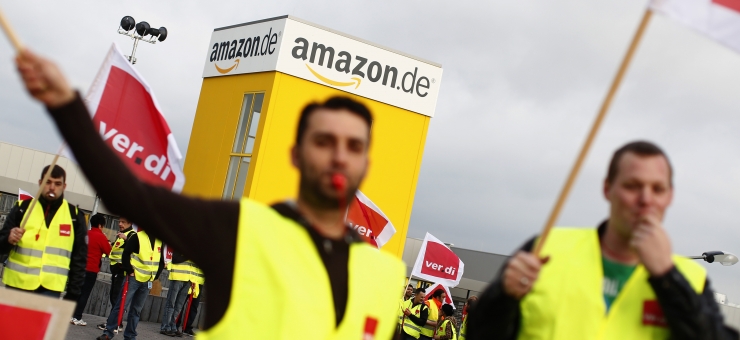BBC Investigation: Amazon workers treated like robots

Working conditions in a UK-based Amazon warehouse could cause “mental and physical illness,” with workers treated like robots according to a BBC investigation.
The undercover research, which will appear tonight on the BBC’s Panorama programme, said night shifts can involve up to 11 miles of walking, during which a worker could be expected to collect orders every 33 seconds.
The coverage was shown to Professor Michael Marmot, one of Britain’s leading experts on stress at work who said conditions are “all the bad stuff at once.”
He told the BBC, "The characteristics of this type of job, the evidence shows increased risk of mental illness and physical illness."
"There are always going to be menial jobs, but we can make them better or worse. And it seems to me the demands of efficiency at the cost of individual's health and wellbeing - it's got to be balanced."
The investigation will mark the latest in a long line of labour complaints against the retail giant, which has been accused of attempting to export its anti-labour rights business model to Europe. In Germany, Amazon workers have been increasing the pressure on the company to enter into collective bargaining by holding regular strike action.
Workers from UNI’s German affiliate Ver.di have recently taking action in response to Amazon’s salary model. The company currently uses its own internal remuneration system that is well below the rates of the retail and mail order sector in Germany. It has so far refused to recognise the union or enter into negotiations.
The revelations come at an important time for Amazon, as the company employs 15,000 extra UK staff to cater for Christmas.
UNI is the global union for the retail sector. General Secretary Philip Jennings said, “We hope this revelation will make Amazon realise that their way of treating workers is unacceptable in the UK or in any other country.
“We believe that a global company needs a global policy to handle issues of workers’ rights, and as an industry leader, Amazon should be setting an example, not undermining the usual standards of the sector."
According to the BBC, the investigation involved an undercover reporter, who was given an agency job at Amazon’s Swansea warehouse, taking a hidden camera inside to record what happened on shifts. Adam Littler was employed as a picker, collecting orders from 800,000 sq ft of storage.
“A handset told him what to collect and put on his trolley. It allotted him a set number of seconds to find each product and counted down. If he made a mistake the scanner beeped,” the BBC article said.
"We are machines, we are robots, we plug our scanner in, we're holding it, but we might as well be plugging it into ourselves", he said.
"We don't think for ourselves, maybe they don't trust us to think for ourselves as human beings, I don't know."
The BBC said the scanner tracked Mr Littler's picking rate and sent his performance to managers. If it was too low, he was told he could face disciplinary action.
Panorama: The Truth Behind the Click, BBC One, Monday 25 November at 20:30 GMT and then available in the UK on BBC Iplayer

